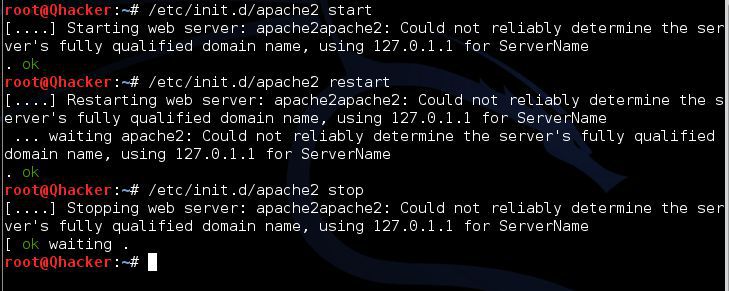
- #DOWNLOAD APACHE WEB SERVER FOR KALI LINUX HOW TO#
- #DOWNLOAD APACHE WEB SERVER FOR KALI LINUX INSTALL#
- #DOWNLOAD APACHE WEB SERVER FOR KALI LINUX UPDATE#
- #DOWNLOAD APACHE WEB SERVER FOR KALI LINUX ARCHIVE#
- #DOWNLOAD APACHE WEB SERVER FOR KALI LINUX UPGRADE#
#DOWNLOAD APACHE WEB SERVER FOR KALI LINUX INSTALL#
Pay attention to out of the configure script.Ĭompile and install Guacamole Server on Debian 10 make make install configure -help.įreeRDP plugins: /usr/lib/x86_64-linux-gnu/freerdp2 Run the configure script to check if any required dependency is missing and to adapt Guacamole server to your system./configure -with-init-dir=/etc/init.dįor more configure options, run. Navigate to guacamole server source code directory cd guacamole-server-$VER Once the download is done, extract the source tarball. VER=1.3.0 wget $VER/source/guacamole-server-$ To make this easy, just set a variable for the current stable release version on the terminal. You can simply run the command below to download Apache Guacamole 1.3.0. Apache Guacamole 1.3.0 is the latest release version as of this writing.
#DOWNLOAD APACHE WEB SERVER FOR KALI LINUX ARCHIVE#
To build guacamole-server, download the latest source archive tarball from Guacamole releases page.
#DOWNLOAD APACHE WEB SERVER FOR KALI LINUX UPDATE#
So to overcome this, install Backport repos and install FreeRDP libraries echo "deb buster-backports main" > /etc/apt//backports.list apt update apt install freerdp2-dev/buster-backportsĪ comprehensive description of these dependency tools is available on required dependencies section. Is OK, rerun configure with the -enable-allow-freerdp-snapshots If you are ABSOLUTELY CERTAIN that building against this version of FreeRDP *** PLEASE USE A RELEASED VERSION OF FREERDP IF POSSIBLE *** This may result in memory leaks or other strange Versions of FreeRDP may have differences in behavior that are impossible toĬheck for at build time. You are building against a development version of FreeRDP. Otherwise, if you install from the default Debian repositories, you might encounter such an error while compiling Guacamole server configure: error: You need to install FreeRDP libraries from Debian Backport repositories.


Next, install FreeRDP libraries enable support for RDP via Guacamole. Libssl-dev libvorbis-dev libwebp-dev libpulse-dev Libpango1.0-dev libssh2-1-dev libvncserver-dev libtelnet-dev \ Libtool-bin libossp-uuid-dev libavcodec-dev libavformat-dev libavutil-dev libswscale-dev \ This, therefore, requires that you need install the required build tools before you can start to build guacamole-server component apt install -y build-essential libcairo2-dev libjpeg62-turbo-dev libpng-dev \ To install guacamole-server, you need to build it from the source. Note: Remember to change $webserverurl with your web server’s actual IP or FQDN.Install Guacamole Server on Debian 10 Run system UpdateĮnsure your system package cache is up-to-date apt update Install Required Build Tools The best and quickest way to do this is the below: # nikto –h $webserverurl Then, you can Run the scanning against your web server. In this way, the terminal will be opened. To find Web Server Vulnerabilities with Nikto Scanner in Kali Linux, follow the below path:ģ- Vulnerability Analysis and click Nikto Use the following command to start Nikto to scan for your considered files with option 1: nikto -host -Tuning 1 This host can be specified with -h or -host option.
#DOWNLOAD APACHE WEB SERVER FOR KALI LINUX HOW TO#
If it is not working, run: perl -h How to use Nikto on Kali Linux To start using the Nikto, replace “” with any domain or IP address you wish to scan and scan any website or IP address. Then, if you see an output as shown below ( lists the version of Nikto installed), you can make sure that Nikto is installed successfully. Now, you can use the following command to install the Nikto: sudo apt-get install nikto -yĪlso, you can verify that if the Nikto website vulnerability scanner is installed and ready for use or not.
#DOWNLOAD APACHE WEB SERVER FOR KALI LINUX UPGRADE#
To refresh your APT package lists and install pending updates, run: sudo apt-get update & sudo apt-get upgrade If you’re running Kali Linux, Nikto comes preinstalled. Join us with this section to see how to add the Nikto vulnerability scanner to your security analysis toolset on Kali Linux can be achieved with just a couple of commands. Many excellent open source security tools are available only in Linux versions.

On other OSes/platforms, you need to install it manually. Nikto is included by default in pen-testing distros like Kali Linux. These features include:Ģ- Ability to scan against 6,700+ known vulnerabilities and scan any web server such as Apache, Nginx, Lighttpd, Litespeed, etcĤ- Scans for configuration-related issues such as open index directoriesĦ- Scans multiple ports on a server with multiple web servers runningħ- Scan through a proxy and with HTTP authenticationġ1- Interactive status, pause, and changes to verbosity settingsġ3- Nikto specifies maximum scan time, exclude certain types of scans and unusual report headers seen as wellġ4- Fast and accurate results How to Install Nikto on Kali Linux In this section, we want to introduce you to 14 Nikto features. Recommended Article: Introducing And How To Install Twofi On Kali Linux Nikto Features


 0 kommentar(er)
0 kommentar(er)
